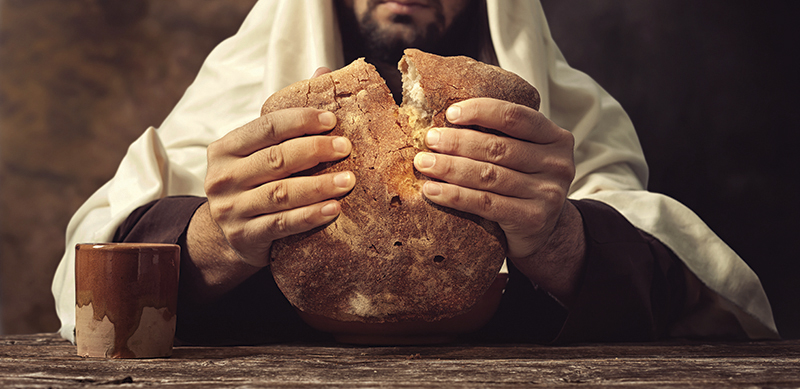XX SUNDAY IN ORDINARY TIME - John 6:51-58
We go on reading the chapter 6 of John’s gospel, in which we are presented with a catechesis on the Eucharist. The Eucharist is presented as a meal, in which we are served the bread of life, a special bread that comes from God. When the Jews heard Jesus speaking about the bread of life, they remembered that God had fed the people of Israel bread from heaven, during their stay in the desert, where they had a very tough experience, with their faith being put to test. Suffering from a shortage of food and fearing for their lives, they revolted against Moses and against God, deciding to choose another leader who would take them back to Egypt. It seems as if they forced God’s hand, leaving him no alternative: either he feeds them or they ignore and abandon him. They looked to God as their enemy, in spite of having been their saviour at every turn of the way and he proved himself faithful, loving and caring. And so God provided the manna, that special food, which kept them alive. Through the generations, the people of Israel kept the memory of that food, which proved to them that their God is the God who works wonders. Turning to Jesus, the Jews asked him: “What sign are you going to give us then, so that we may see it and believe you?” (Jn 6:30). Jesus had fed a huge crowd, but that was not enough. They wanted more and bigger signs to satisfy their curiosity. They behaved like their ancestors, treating God as a tool in their hands, who should always be ready to answer their needs. Jesus unmasked their intentions, going straight to the point, by telling them: “you are looking for me, not because you saw signs, but because you ate your fill of the loaves” (Jn 6:26). And he pointed out their misconceptions, telling them that the manna was just food, earthly food, and not the true bread from heaven. Then, he presented himself as the bread of life. However, only those who have faith may eat that bread. If we believe in Jesus and accept him as Lord and Saviour, then he will satisfy our hunger and quench our thirst - hunger and thirst for love, justice and peace. In the sermon on the mountain, Jesus proclaimed: “Blessed are those who hunger and thirst for righteousness, for they will be filled” (Mt 5:6). This bread is the bread of life, since all those who are fed with this bread will share in the resurrection of Jesus, thus living forever: “This is indeed the will of my Father, that all who see the Son and believe in him may have eternal life; and I will raise them up on the last day” (Jn 6:40).
And Jesus makes it very clear that there is no distinction between the bread of life and himself. In the Last Supper, breaking the bread and sharing it with his disciples, Jesus said: “This is my body” (Lk 22:19; 1 Co 11:24), a body that is going to be given for the world. Jesus offered his life in sacrifice for the redemption of the world. In John’s gospel, Jesus uses similar words: “The bread that I will give is my flesh for the life of the world” (Jn 6:51).
Jesus invites us to his table and offers himself to us as the bread of life. By eating this bread, we become one with Jesus: “Those who eat my flesh and drink my blood abide in me, and I in them. Just as the living Father sent me, and I live because of the Father, so whoever eats me will live because of me” (Jn 6:56-57). We must approach his table in an attitude of thanksgiving and praise, for the Lord feeds us with the bread that strengthens us for the long journey until we may reach God’s Mountain and be received in his house in the company of Jesus.





